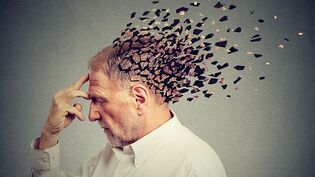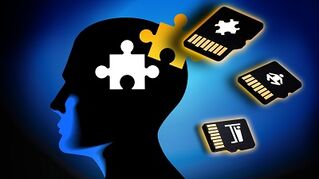
There are diametrically contradictory opinions about drugs to improve memory. Some say it is useful and helps deal with increased intellectual stress, helps effectively and efficiently.
Others say that this is just a myth, that there is no advantage to taking these drugs, that it can be harmful and addictive to these drugs. Let’s try to consider both perspectives in more detail and find out who is right.
A little about the memory
Memory is a mental function associated with higher nervous activity, and with the help of which occurs the accumulation, preservation, and reproduction of previously acquired information. Memory allows you to store information for a long time about the external world or about the body’s responses to any impact, and also allows you to use this information to properly organize activities in the future.
Memory includes several different but related processes.
- Reminder- new data input, perceptions.
- Storage- includes data accumulation, sensations, processing and assimilation. This process allows a person to learn, develop their thinking and speech.
- Reproduction and recognition- realization of elements, actions, perceptions of the past. Reproduction is involuntary (elements of a “float” in a person’s mind without their will and efforts) and arbitrary.
- Forgetting- loss of ability to reproduce and recognize previously memorized elements. It can be temporary or permanent. Incomplete forgets, when information is reproduced or identified by mistake or in part.
Basic memory types
There are many types and subtypes in memory classification. Let's talk about its main types.
- Sensory memory- preserving information from the senses after stimulation.
- Tactile memory- preserves information from receptors as a result of contact.
- Motor memory- saving movement information, many people remember that there are movements that they perform automatically.
- Semantic memory- saving information about facts such as learning stories, dates, multiplication table.
- Short-term memory- saving information for a short time. There is a small volume.
- Long-term memory- storing information indefinitely, including whole life.
Laws of Memory

Few people know that there are some laws of memory. This is not an invention of the author, but scientifically established and scientifically created real life patterns.
- Law of repetition- information is remembered much better if it is repeated.
- Law of Welfare- if a person is interested in information, they will remember it faster and better.
- Law of the Margins- the information given at the beginning and end is best remembered.
- Law of Understanding- if the information is deeply understood, it will be better remembered.
- Best Distance Law- the amount of memorized information should not exceed the amount of short-term memory.
- Installation Law- someone who has given himself the installation that he needs to remember this or that information will remember it faster and better.
- Prohibition law- by memorizing similar concepts, the old information "overlaps" with the new one.
- Law of Context- remembering things that can be related to previously unfamiliar concepts goes faster.
- Law of Action- if what is remembered is used in practice, then remembering happens in a more efficient and quicker way.
These laws can be used if you want to remember something faster and better, as well as train your memory.
Causes of memory loss
- Organic brain damage- acute cerebrovascular accident, traumatic brain injury, brain tumor.
- Diseases of other organs and systems- diseases of the liver, cardiovascular system.
- External factors- poor ecology, sharp change in surroundings, stress, sleep disturbances.
- Age-related changes in brain structure- a decrease in the number of interdepartmental connections.
- Chronic intoxication- smoking, drug taking, substance abuse, alcoholism, drug abuse (sedatives, tranquilizers).
Treatment of memory disorders
If memory enhancement is required, medication is not prescribed immediately. First they try to apply non-drug methods. These include:
- Walking briskly in the fresh air. This increases oxygen access to the brain. This improves the efficiency of his work.
- Normalization of sleepand depression.
- Evening training- the habit of recalling all the events of the day in reverse order, that is, first of all, remembering what happened in the evening, and at theend - morning events, it can be unusual training. It is best to do this before you go to bed, lie in bed.
- Positive attitude, don't lie to this- don't think you have a bad memory, no one has canceled the effect of self-hypnosis. If at some point you can’t remember something, don’t worry, don’t be angry, just draw attention, do something else, and then try again to remember the things you forgot.
- Daily training- solving crosswords, puzzles, scan words.
- Education- learn poetry, foreign languages, do it regularly, gradually increase the amount of material you learn.
Memory Loss Medications

Clearly learning poetry, foreign language, solving puzzles is not easy, you have to “push”, extra time should be allocated to walk and solve puzzles, which is notpractically a working person.
Taking a pill is much easier, calm down and expecting the magical power of medicine - your memory will improve immediately and you won't have to do anything! A modern city dweller is so lazy and spoiled by the fruits of civilization that few people now have a purpose and want to spend their time and energy on training memory. So one is looking for an answer to his question - what are the pills to improve memory?
So, let's consider two opposite views on this topic:
Positive opinion
Proponents of the use of these funds say that some drugs help improve the blood supply to brain cells, thereby improving their nutrition and providing more oxygen, which improves metabolic processes in neurons.Nootropics and drugs that improve the rheological properties of the blood help with this.
Herbal preparations are now widespread, which not only enhance metabolic processes in neurons in themselves, but also enhance the effect of nootropic drugs.
But it should be remembered that any drug (absolutely any) has its own violations and side effects, so it should only be prescribed by a doctor in each individual clinical case.
Negative opinion
According to some experts, the base also has a disadvantage. Several years ago, experts raised the question - are these drugs effective or are they just a placebo effect?
As a result of many studies, the effectiveness of nootropics has not been proven. There is no evidence that they have a beneficial effect on memory. One of the small studies has proven the effectiveness of medications that have little effect, but not in severe cases.
Traditional methods and herbal preparations such as ginseng, vitamin E have not been researched. The evidence base is only for the use of herbal medicines in patients with dementia. But there are no data on the effectiveness of use in relatively healthy people.
Finally, I want to say that when you think of the best drugs to improve memory, do not forget that a doctor must prescribe them. And the doctor should also evaluate effectiveness in each case. Do not rely on advice from friends, neighbors or relatives.
If you think your memory has deteriorated, see a neurologist. This may not be the problem at all, it may cause distractions, there may be some other problems. It is also necessary to find out the cause of this condition. And only a qualified doctor can do this.







































































